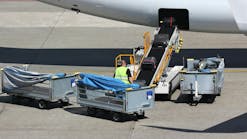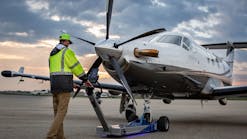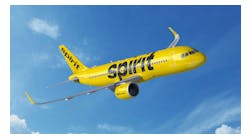Northwest Airlines wants to lay off about two-thirds of its remaining mechanics and cleaners as it squeezes $203 million in annual wage and other savings from them and other members of their union.
That, according to union sources, is the struggling carrier's latest offer to striking mechanics.
It's far worse than the airline's previous offer — which led some 4,400 Northwest mechanics, cleaners and custodians to walk off the job late Aug. 19, said Ken Reed, president of the Aircraft Mechanics Fraternal Association local in Duluth.
"I don't see how anyone in their right mind would be able to accept it," he said. "I can't see how the company, if it's bargaining in good faith, can offer something as ludicrous as this. … Their original proposal was the reason we went on strike. Now, they've only made it worse."
Northwest made the proposal Thursday as AMFA and the airline went back to the bargaining table for mediated talks in Minneapolis. Talks ended late Thursday and are scheduled to resume this morning.
The airline's previous offer would have cut wages by about 25 percent but would have provided jobs for about 2,750. Northwest's expected annual savings would have totaled $176 million. Now Northwest is signaling it wants to keep only 1,020 of the some 3,400 mechanics it had left on its payroll last month, said Reed.
Under Northwest's proposal, the airline would keep 820 AMFA mechanics combined in the Twin Cities and Detroit, along with 200 in Duluth.
Northwest would eliminate the jobs of some 900 cleaners and custodians who are on strike. "They don't want them at all," said Reed.
Northwest's latest contract proposal also apparently calls for deeper wage cuts. But Reed did not have those figures Thursday night. He wasn't aware of any severance offer from Northwest.
Jeff Mathews, a spokesman for the mechanics union, declined to comment on Northwest's proposal Thursday night. Eagan-based Northwest would not comment.
Earlier this week, Northwest indicated that any new offer to the mechanics would include deeper cuts, reflecting its worsening finances. Soaring jet fuel prices are really burning Northwest. The airline expects its fuel costs will jump 50 percent in 2005 to $3.3 billion.
The airline, which has lost about $3 billion on its operations since the start of 2001, reports that it's now losing $4 million a day. That's adding urgency to its campaign to extract at least $1.1 billion in annual labor savings from its employees.
So far, though, Northwest has only $300 million in savings in hand, mostly from its pilots.
If it can't hit its target for labor savings and get more time to make payments to its pension plans, which are underfunded by $3.8 billion, Northwest says it would file for Chapter 11 bankruptcy protection.
Northwest insists its aircraft maintenance and flight operations are going smoothly during the strike, as it's using licensed managers and temporary replacement workers to perform maintenance work at its hubs in the Twin Cities and Duluth.
The union's stance all along has been that the temporary replacement workers are of poor quality and that it would only be a matter of time until difficulties would slow the airline's operations.
But Northwest is threatening to permanently replace its striking mechanics by Tuesday if it does not reach a settlement with AMFA.
Striking cleaners will have no jobs at Northwest, the airline insists. Their work — and jobs — have been "permanently transferred to more efficient third-party vendors," Northwest said in a letter to AMFA this week.
By permanently replacing strikers, or even just threatening to do it, Northwest is probing to see if it can find a crack in the resolve of AMFA and its members, says John Remington, a professor of industrial relations at the University of Minnesota's Carlson School of Management.
Some mechanics might return to work to try to secure their jobs, albeit at much lower wages, said Remington. The question is how many.
"Northwest may suspect there is some disaffection in the ranks (of AMFA)," said Remington. If Northwest permanently replaces striking AMFA members, the move will have a big impact on contract talks with other unions at the airline, said Peter Rachleff, a Macalester College professor of labor history.
It could intimidate other unions, making them comply more readily with Northwest's demands, he said. Or it could spur the unions to "hang together" rather than "hang separately."
Northwest has achieved a "clear victory" over AMFA, airline industry consultant Darryl Jenkins said in an interview early Thursday.
Still, given the state of the industry these days, Jenkins figures Northwest will need to enter bankruptcy to deal with its financial and other problems.
"It would not surprise me if Northwest filed for Chapter 11," he said. "If I were an adviser to them, I would recommend it."





